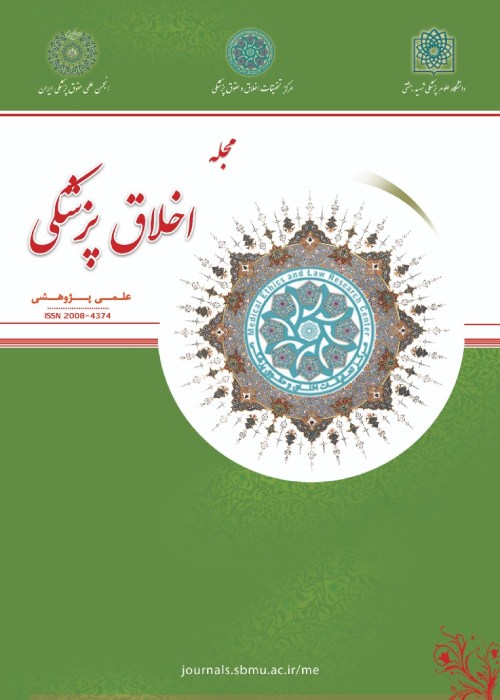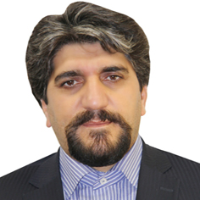Comparison of the spiritual care needs of mothers of less than 14-year-old children suffering from cancer in the diagnostic and terminal stages of the disease
Author(s):
Article Type:
Research/Original Article (دارای رتبه معتبر)
Abstract:
Background And Aim
Paying attention to spiritual needs of patients as an important aspect of care is not only essential for improving health consequences, but also to respect the dignity of patients. Spiritual care is the major core of the quality of life of patients and their families, which becomes possible through identifying the care needs of clients. Research has shown that the needs of a child and their family from the time of diagnosis of cancer change until the treatment stage and other stages of the disease. The patient childs parents feel insecure and do not know how they should take care of their patient child. This study has been conducted with the aim of comparatively investigating the spiritual care needs of mothers of children suffering from cancer at early stages of diagnosis as well as terminal stages of the disease.Materials And Methods
This descriptive-analytical study was conducted on 400 mothers of less than 14-year-old children suffering from cancer at early stages of diagnosis and terminal stages of the disease, hospitalized in blood and oncology wards for children of hospital throughout Tehran in 1394-95. All mothers whose children were hospitalized in the mentioned wards due to cancer and had the inclusion criteria were included in the study through available sampling. The inclusion criteria for the mother to enter the study were: having a child below 14 years of age, hospitalization of the child in the ward for at least two days, having early criteria for diagnosis and terminal stage of the disease (according to the documents available in the patients file, diagnosis made by the specialist, guidelines of the ward head-nurses, or the information of the childs patent), as well as literacy (both reading and writing). The data collection instrument included patient spiritual needs assessment scale, which was translated into Persian and validated. This questionnaire included 18 questions about demographic information of the mother and her child (including 9 questions about the information associated with age, gender, disease, time of diagnosis, place of residence, treatments tried, having a relative with cancer, the number of hospitalization of the child during one month, and 9 questions about the information associated with age, marital status, education, housing situation, level of monthly income, support of social institutions, supportive resources in the family, and correspondent of the childs disease. Spirit questionnaire includes 70 questions with a Likert scale and two open-ended questions. The first section includes 43 five-option items in relation with reflection of the spiritual care needs of the mother (never score 1, rarely score 2, sometimes score 3, most of the time score 4, and always score 5). The second section includes 27 four-option items with a Likert scale and questions the affairs that mothers may want the childs nurse to do those cares for them. The options include: absolutely disagree score 1, disagree score 2, agree score 3, absolutely agree score 4). The lowest score of the first section implies more need of mothers to receiving spiritual care, and the lowest score of the second section suggests refusal by the mother to receive spiritual care by a nurse. This scale has no cut-off point, but considering the instruments median, the subjects were categorized into three groups of extreme, medium, and low, in terms of spiritual care. The data was analyzed by SPSS 18. The responses given to the open-ended questions of the questionnaire (10 persons from the early diagnostic stage and 20 from the terminal stage) were analyzed and classified in a directed way. Eventually, through a quantitative method, the frequency of the obtained themes was calculated.Ethical considerations: After receiving confirmation from the ethics committee of Tehran University of medical sciences with the code of (9211196001_137223), the researcher visited the environment of the research and after receiving permission from the hospital officials and explanation about the study objectives, the written informed consent of mothers was received to participate in the study.
Findings: Most children in both groups had an age of between 5 and 14 years old, with 46.1 and 57.7% being in an early diagnostic and terminal stage groups, respectively. In both groups, around half of the children were male and the other half were female. Most of the children in both groups lived in Tehran. The majority of children in the terminal stage group (52.4%) had been hospitalized three times or more per month, while most children in the early diagnosed group (74%) had been hospitalized twice or less per month. A total of 97% of the children in both groups had a second-degree relative with cancer. Further, over 80% of children in both groups had undergone chemotherapy. In both groups, most mothers had an age of between 25 and 35 years old, were married, housewife, and an educational level of diploma. In most families, the main reporter of the family was the father, the average monthly income of the household was less than 250 Dollars and they had rented houses. A total of 59.1% of the families in the early diagnosed group and 44% of the families in the terminal stage group had been supported by social institutions.
The average of spiritual care needs in the terminal stage group was significantly higher than the diagnostic group (p
Conclusion
The spiritual care needs in the mothers of the terminal stage group and willingness of the mothers in both groups across different stages of the disease are contemplative. Considering the progressive increase in the rate of cancer in children and spirituality as an inseparable part of the life of patients and their families, measurement of the spiritual care needs of mothers with children suffering from cancer is essential in care planning. Meeting the spiritual care needs should be taken into account in health policymaking through developing trust and companionship of the family, establishing a favorable relationship, providing a silent and peaceful place for mothers praying, encouraging mothers to talk about their spiritual concerns, and holding praying ceremonies. Accordingly, it is suggested that spiritual care be incorporated in the comprehensive care protocol of these patients and their families.Keywords:
Spiritual Care , Children , Cancer , Nursing
Language:
Persian
Published:
Journal of Medical Ethics, Volume:11 Issue: 41, 2017
Pages:
45 to 56
magiran.com/p1772291
دانلود و مطالعه متن این مقاله با یکی از روشهای زیر امکان پذیر است:
اشتراک شخصی
با عضویت و پرداخت آنلاین حق اشتراک یکساله به مبلغ 1,390,000ريال میتوانید 70 عنوان مطلب دانلود کنید!
اشتراک سازمانی
به کتابخانه دانشگاه یا محل کار خود پیشنهاد کنید تا اشتراک سازمانی این پایگاه را برای دسترسی نامحدود همه کاربران به متن مطالب تهیه نمایند!
توجه!
- حق عضویت دریافتی صرف حمایت از نشریات عضو و نگهداری، تکمیل و توسعه مگیران میشود.
- پرداخت حق اشتراک و دانلود مقالات اجازه بازنشر آن در سایر رسانههای چاپی و دیجیتال را به کاربر نمیدهد.
In order to view content subscription is required
Personal subscription
Subscribe magiran.com for 70 € euros via PayPal and download 70 articles during a year.
Organization subscription
Please contact us to subscribe your university or library for unlimited access!



